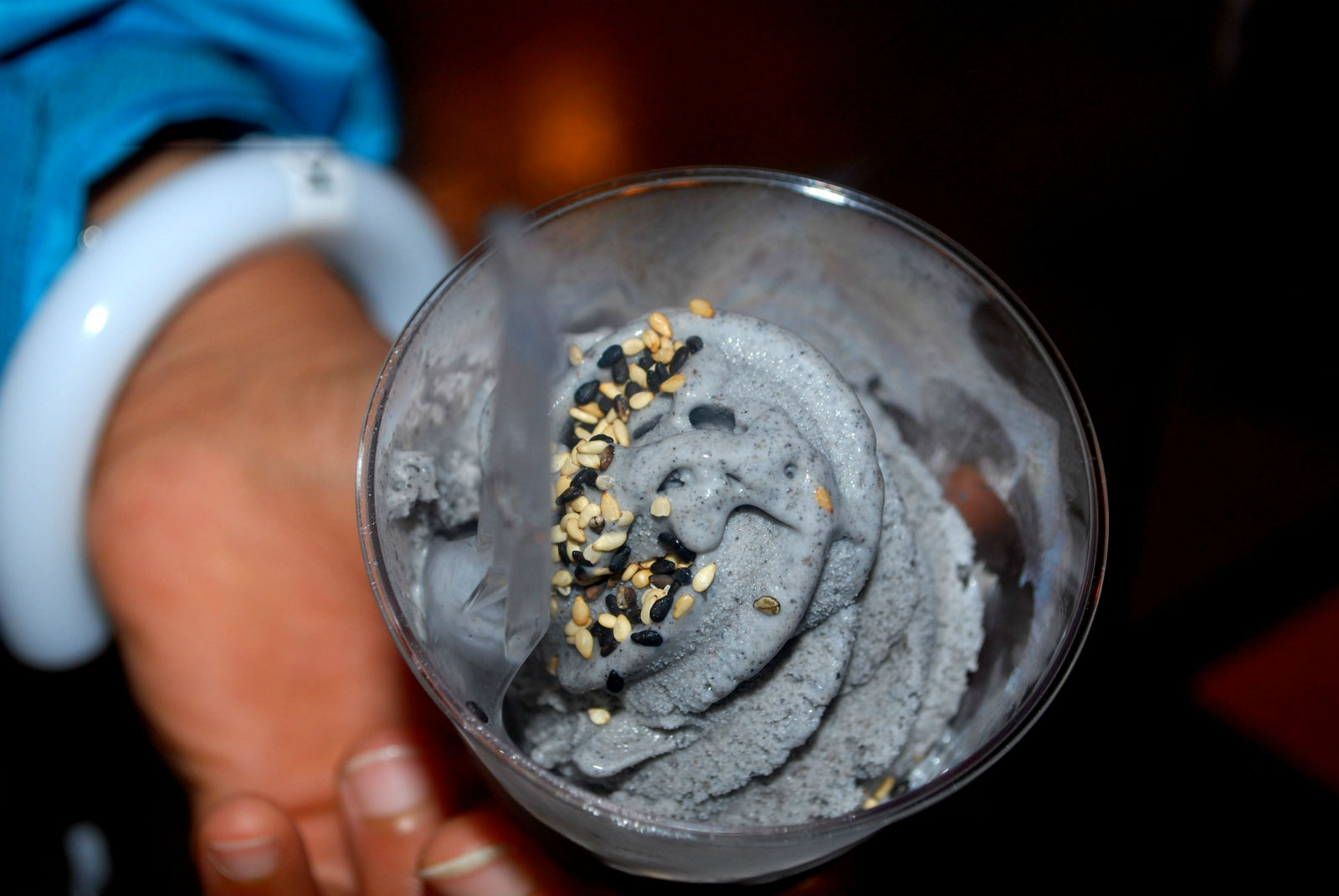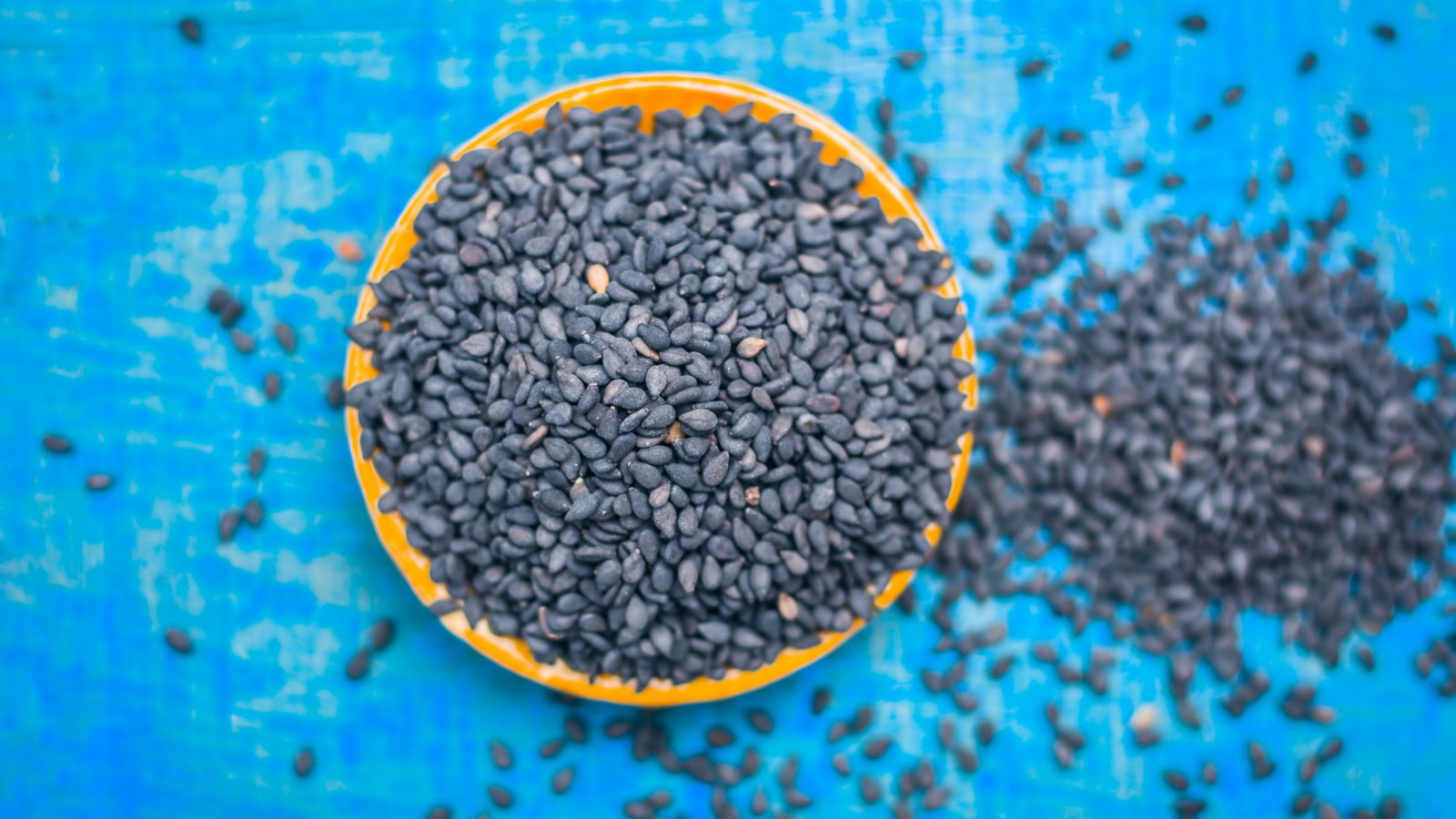Earlier this spring, Seed + Mill, the Chelsea Market artisanal tahini and halva stand in New York City, introduced a new flavor to great fanfare: A trapezoidal cake of inky black sesame halva posted on their Instagram account generated nearly a thousand likes and dozens of excited comments. The frenzy around Seed + Mill’s new black sesame halva begs the question: Is black tahini the new, well, black?
We have all seen black sesame seeds before, sprinkled on sushi or in other Japanese and Korean dishes. According to James Beard Award semi-finalist David Park, chef-owner of the recently shuttered Hanbun outside Chicago, black sesame seeds are a traditional ingredient in Korean cooking — appearing in rice cakes, breads, and even porridge. In contemporary Korean cooking, black sesame appears in elevated desserts such as the black sesame pudding with chocolate ganache and whipped cream at San Francisco’s Namu Gaji. The color contrast that black sesame seeds provide is part of their appeal. But Park contends that black sesame seeds have “bolder, richer… earthier, nuttier and spicier notes than white sesame seed does.…”

A paste made from unhulled, roasted black sesame paste, known as nuri goma, is a popular ingredient in Japanese ice cream, pastries and baked goods, especially when sweetened with sugar or honey. Nuri goma imparts a roasted, nutty flavor with earthy undertones to these dishes.
Nuri goma sounds a lot like tahini, Israel’s beloved and practically ubiquitous sesame paste. But tahini is typically made with white or tan sesame seeds. Is there such a thing as black tahini? Well, of course there is. How else would Seed + Mill make its black sesame halva? But here is where things get complicated.
The Nosher celebrates the traditions and recipes that have brought Jews together for centuries. Donate today to keep The Nosher's stories and recipes accessible to all.
According to Inbal Baum, founder and CEO of culinary tour company Delicious Israel, if you see “black tahini” on a menu in Tel Aviv, you will most likely encounter regular tahini that has been colored “with some sort of blackening agent — usually roasted eggplant skin — which makes it very smoky.” To get a taste of this trend, check out Baum’s recipe for whole roasted cauliflower with smoky black tahini.
For now, black sesame seeds may be more common in Israel’s Asian restaurants than in the tahini at the local falafel stand. But Lisa Mendelson of Seed + Mill — who grew up in Israel — sees that changing. According to Mendelson, as Israelis travel more and become exposed to different cuisines, they have become increasingly open to trying new ingredients and even incorporating those ingredients into traditional Israeli dishes. So while Mendelson hasn’t seen black hummus yet, she thinks it is only a matter of time.
Here in the U.S., where tahini is not as fundamental to daily life, consumers are even more open to the novelty of tahini made from black sesame and its unique flavor profile. Mendelson reports that Seed + Mill customers love the new black sesame halva in part because it less sweet than the company’s other varieties. The recipe for the black sesame halva uses the same amount of sugar, but because the black tahini itself is more bitter, the result is less sweet. Shelby Zitelman, the CEO and co-founder of Soom Foods, manufacturer of Chef Michael Solomonov’s favorite tahini, agrees that black tahini tastes different than regular tahini. “It’s really rich,” says Zitelman.
Think you can handle the intensity of black tahini? Kevala, a natural foods company, makes a black tahini from organic, unhulled black sesame seeds. (By the way, do not fall into the trap of thinking that white sesame seeds are black sesame seeds with the hull removed. Black sesame seeds would look white if their hulls were removed, but they are not the same as white sesame seeds. Got it?) You can use Kevala’s black tahini anywhere you would use regular tahini, but Lisa Mendelson especially recommends using it for baking. Mendelson makes a guilt-free, low-sugar, vegan black tahini truffle that is exceptionally rich, nutty, and creamy. Love the dramatic color of black tahini? It also makes a striking natural food dye. No eggplant skins needed.



